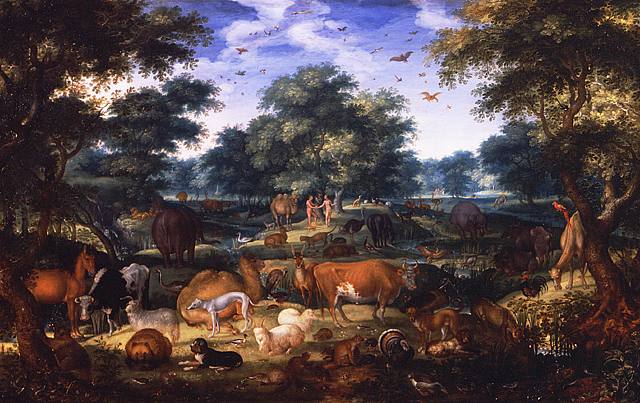 In part one of this series we learned that according to the timeline of Acts and Paul’s own words from Galatians, and the historic famine of 44 A.D., Paul’s conversion happened 27 A.D. Since most modern Biblical scholars place Jesus’ crucifixion between 30 and 33 A.D., Paul’s conversion happened before Christ was crucified. How then could Paul have been converted to the Christ of Orthodoxy if it wasn’t this Christ that appeared to him? [Read more…] about What is the True Symbolic Nature of Paul and His Christ: Part 2
In part one of this series we learned that according to the timeline of Acts and Paul’s own words from Galatians, and the historic famine of 44 A.D., Paul’s conversion happened 27 A.D. Since most modern Biblical scholars place Jesus’ crucifixion between 30 and 33 A.D., Paul’s conversion happened before Christ was crucified. How then could Paul have been converted to the Christ of Orthodoxy if it wasn’t this Christ that appeared to him? [Read more…] about What is the True Symbolic Nature of Paul and His Christ: Part 2
Literal vs Spiritual
What is the True Symbolic Nature of Paul and His Christ: Part 1
 Today’s very brief post will begin a series that will be a bold attempt to decipher the symbolic nature of the Apostle Paul. What does he really represent in the grand scheme of the New Testament?
Today’s very brief post will begin a series that will be a bold attempt to decipher the symbolic nature of the Apostle Paul. What does he really represent in the grand scheme of the New Testament?
Although many Christians are blissfully unaware, the Apostle Paul is sometimes considered an enigma in the scholarly world. There are many aspects of his theology that seem to disagree with and contradict the theology of the Gospels. Scholars such as Gerald Massey have done a great job introducing us to aspects of Paul that would never be taught in the institutionalized church. He was a great pioneer that has emboldened many to see the Apostle Paul in a new light. [Read more…] about What is the True Symbolic Nature of Paul and His Christ: Part 1
The Biblical Meaning of Man’s Dominion over the Animals
 People have long thought that the Bible’s creation story in Genesis is literal. Ancient Rabbis, learned scholars of the Hebrew language, have always taught us that those who fail to see beyond the literal stories miss out on the deeper spiritual meanings latent within the text. Those of us who are guilty of reading it with literal eyes only are missing a treasure-trove of knowledge put there to help man crawl from his low spiritual state. [Read more…] about The Biblical Meaning of Man’s Dominion over the Animals
People have long thought that the Bible’s creation story in Genesis is literal. Ancient Rabbis, learned scholars of the Hebrew language, have always taught us that those who fail to see beyond the literal stories miss out on the deeper spiritual meanings latent within the text. Those of us who are guilty of reading it with literal eyes only are missing a treasure-trove of knowledge put there to help man crawl from his low spiritual state. [Read more…] about The Biblical Meaning of Man’s Dominion over the Animals
Tradition of the Gnostic Apostle: The Legacy of Christ in You
 I have always had a passion for the Bible. My interest in Christian origins introduced me to the gnostic form of Christianity, which I’m convinced was the way it began. I have been taken by it and through it Christ is more alive for me than ever. What is written here will be elementary for some and new for others. The point is to see the beauty.
I have always had a passion for the Bible. My interest in Christian origins introduced me to the gnostic form of Christianity, which I’m convinced was the way it began. I have been taken by it and through it Christ is more alive for me than ever. What is written here will be elementary for some and new for others. The point is to see the beauty.
The word ‘gnostic’ describing a spiritual-mystical tradition and persons holding to that tradition was not in common use until the 17th century. If you had asked a so-called “gnostic” in the 2nd [Read more…] about Tradition of the Gnostic Apostle: The Legacy of Christ in You
Meditation and Prayer, Stillness and Silence
 The Bible is a book of allegory. It is a book of symbols, but the intriguing thing about it is that it interprets its own symbols, so we never have to be in the dark about the meaning of Biblical symbols. One of the reasons the Bible is such a voluminous work is that its truths are hidden like pearls in the heart of the earth. One must dig for the hidden treasures within its pages. “It is the glory of God to conceal a thing: but the honour of kings is to search out a matter.” (Prov. 25:2). The secrets of the Kingdom are concealed [Read more…] about Meditation and Prayer, Stillness and Silence
The Bible is a book of allegory. It is a book of symbols, but the intriguing thing about it is that it interprets its own symbols, so we never have to be in the dark about the meaning of Biblical symbols. One of the reasons the Bible is such a voluminous work is that its truths are hidden like pearls in the heart of the earth. One must dig for the hidden treasures within its pages. “It is the glory of God to conceal a thing: but the honour of kings is to search out a matter.” (Prov. 25:2). The secrets of the Kingdom are concealed [Read more…] about Meditation and Prayer, Stillness and Silence
Unconditional Love
 In his recent article, 16 Scriptural Reasons NOT to take the Bible Literally, Joshua addresses a matter which is a little difficult for me. Although I totally agree with him that not everything should be taken literally and that the Bible was not written in order to give an exact account of historical happenings, I feel that putting it this way goes too far. I know that Joshua does not mean it that way, but I do feel some kind of judgment in his title, some feeling of superiority and also duality, right versus wrong. I also feel it will hurt the feelings of people who honestly believe that everything is meant to be taken literally and certainly will not make them willing to listen to any explanations.
In his recent article, 16 Scriptural Reasons NOT to take the Bible Literally, Joshua addresses a matter which is a little difficult for me. Although I totally agree with him that not everything should be taken literally and that the Bible was not written in order to give an exact account of historical happenings, I feel that putting it this way goes too far. I know that Joshua does not mean it that way, but I do feel some kind of judgment in his title, some feeling of superiority and also duality, right versus wrong. I also feel it will hurt the feelings of people who honestly believe that everything is meant to be taken literally and certainly will not make them willing to listen to any explanations.
In Judaism there are four different levels [Read more…] about Unconditional Love
16 Scriptural Reasons NOT to take the Bible Literally!
 From time to time I get e-mails asking why the Bible shouldn’t be taken literally. One of the reasons is that the scripture itself makes this clear. I’ve decided to provide the scriptural reasons themselves all in one post so I can refer people to it. This is by no means an exhaustive list, but it gets the point across.
From time to time I get e-mails asking why the Bible shouldn’t be taken literally. One of the reasons is that the scripture itself makes this clear. I’ve decided to provide the scriptural reasons themselves all in one post so I can refer people to it. This is by no means an exhaustive list, but it gets the point across.
Old Testament Scriptures
1) Psalms 78:2: [Read more…] about 16 Scriptural Reasons NOT to take the Bible Literally!
The Generation of the Christ
 Today I am going to take you on a literal and symbolic journey covering over half of the Bible. I am going to show you how this journey is included in just the first chapter of the New Testament, Jesus’ birth record. We’ll start with Matthew 1:1. It reads:
Today I am going to take you on a literal and symbolic journey covering over half of the Bible. I am going to show you how this journey is included in just the first chapter of the New Testament, Jesus’ birth record. We’ll start with Matthew 1:1. It reads:
“The book of the generation of Jesus Christ, the son of David, the son of Abraham” (Matt. 1:1).
It is a register of births, which is mostly skipped over in church; at least, I cannot remember ever having heard it read during a church service. I suppose most people read it through privately, but did you ever see the significance of it? I certainly did not. At least not until I began to dig deeper. [Read more…] about The Generation of the Christ
The Seven Sacraments: How They Relate to our Chakras and Higher Consciousness
 In our last post we learned that Jesus taught God is spirit, and it is through spirit, or consciousness, that we truly worship and draw near to God. Worshipping God through the human spirit means conscious choice and action. As we choose to live consciously, consciousness will be elevated, and an elevation in consciousness is direct evidence of worshiping God.
In our last post we learned that Jesus taught God is spirit, and it is through spirit, or consciousness, that we truly worship and draw near to God. Worshipping God through the human spirit means conscious choice and action. As we choose to live consciously, consciousness will be elevated, and an elevation in consciousness is direct evidence of worshiping God.
In today’s post we will address Caroline Myss’s belief that there is a correlation, symbolically, between the meaning of the seven sacraments of the church and our seven chakras. [Read more…] about The Seven Sacraments: How They Relate to our Chakras and Higher Consciousness
The Inner Beauty of the Bible Stories: The Soul’s Journey Beneath the Literal Interpretation
The Bible is not a book about history, even though there is history in the Bible. Archaeological excavations are made on the basis of information found in the Bible, and ruins are discovered that confirm the expectations. The Bible makes use of this history, however, as a means to explain the process of Man’s involution/descent into the material world, his stay there, and his evolution and ascension out of it again.The same story is told over and over [Read more…] about The Inner Beauty of the Bible Stories: The Soul’s Journey Beneath the Literal Interpretation
Why Did God Ask Abraham to Sacrifice Isaac?
 One of the hardest stories in the Bible to swallow, especially for mothers, is when God asks Abraham to sacrifice Isaac. The whole idea of God asking Abraham to kill his most beloved son conjures up all kinds of monstrous thoughts about a being that is supposed to be the very essence of love. I recently received an e-mail from a reader about an article written by James Goodman in the Huffington Post, entitled, The Five Most Terrifying Words in the Bible. The title comes [Read more…] about Why Did God Ask Abraham to Sacrifice Isaac?
One of the hardest stories in the Bible to swallow, especially for mothers, is when God asks Abraham to sacrifice Isaac. The whole idea of God asking Abraham to kill his most beloved son conjures up all kinds of monstrous thoughts about a being that is supposed to be the very essence of love. I recently received an e-mail from a reader about an article written by James Goodman in the Huffington Post, entitled, The Five Most Terrifying Words in the Bible. The title comes [Read more…] about Why Did God Ask Abraham to Sacrifice Isaac?
Noah Gets Drunk!?
 Like me, maybe you’ve wondered why the “righteous” Noah gets drunk after the flood. Genesis 9:20-21 states:
Like me, maybe you’ve wondered why the “righteous” Noah gets drunk after the flood. Genesis 9:20-21 states:
“And Noah began to be a husbandman, and he planted a vineyard: And he drank of the wine, and was drunken; and he was uncovered within his tent.”
Hmm…a naked, drunk Noah? Resembles more of the morning-after scene from a frat party rather than a righteous servant. And doesn’t this seem a little less than “righteous?” St. Paul tells us not to even keep company with a drunkard (1 Cor. 5:11), but Noah plants a vineyard and makes wine as soon as he steps off the ark [Read more…] about Noah Gets Drunk!?
The Return of Jesus Christ: An Inside Job
 The return of Christ is the most respected and anxiously awaited day for Christians. The Bible states that when he comes back, he’s going to rule every tribe, tongue, and nation. But has the original meaning of the return of Christ lost its significance? Are Christians forfeiting a much greater revelation of the truth by believing in a literal return? What if the true import of the return of Christ is far more real, far more enduring, and far more fulfilling than Christendom could have ever imagined, without a literal return? [Read more…] about The Return of Jesus Christ: An Inside Job
The return of Christ is the most respected and anxiously awaited day for Christians. The Bible states that when he comes back, he’s going to rule every tribe, tongue, and nation. But has the original meaning of the return of Christ lost its significance? Are Christians forfeiting a much greater revelation of the truth by believing in a literal return? What if the true import of the return of Christ is far more real, far more enduring, and far more fulfilling than Christendom could have ever imagined, without a literal return? [Read more…] about The Return of Jesus Christ: An Inside Job